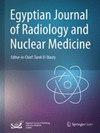Could ultrasound alone substitute MR imaging in evaluation of Crohn’s disease complications?
IF 0.5
Q4 RADIOLOGY, NUCLEAR MEDICINE & MEDICAL IMAGING
Egyptian Journal of Radiology and Nuclear Medicine
Pub Date : 2024-08-30
DOI:10.1186/s43055-024-01343-7
引用次数: 0
Abstract
Crohn’s disease is a chronic disease that causes remitting and relapsing inflammatory episodes in the transmural part of the gastrointestinal system. It usually affects young people. The study sought to establish whether ultrasound can visualize important/useful diagnostic features and complications of the disease in the same way that MR enterography (MRE) can. The study is a prospective cohort of 133 patients of various disease stages (active and in remission) who had previously been seen by a gastroenterologist. All patients underwent abdominal and pelvic ultrasound examinations, with each of the five intestine segments checked independently for thickening and active inflammation. Complications of fistulas, abscesses, and stenosis were evaluated. Findings at MRE together with ileocolonoscopic results were deemed the standard reference. Ultrasound showed wall stenosis ranging from 5 to 12 mm, with a mean ± SD of 7.73 ± 2.30. A single loop was present in 69.2% of cases. The ileum was the most heavily involved loop portion (66.7%). In 72.9% of patients, stenosis and dilatation were present, whereas 69.7% showed active inflammation. Complications such as fistulas and abscess formation (21.2%) were identified. Ultrasound was found to be an effective tool for detecting stenosis and dilatation in the examined patients, with sensitivity of 84% and 87%, and specificity of 91% and 97%, respectively. A high accuracy of 90.9% was demonstrated for abscess formation. Ultrasound is a noninvasive method that is comparable to MRI for detecting damaged bowel segments and transmural complications such as bowel strictures, fistulas, and abscesses in Crohn’s disease patients. However, MR imaging is more comprehensive in providing detailed information about the disease's extent and activity.在评估克罗恩病并发症时,超声波能否单独替代磁共振成像?
克罗恩病是一种慢性疾病,会导致胃肠道跨膜部分的炎症发作缓解和复发。它通常影响年轻人。该研究旨在确定超声波是否能像磁共振肠造影术(MRE)一样显示该病重要/有用的诊断特征和并发症。该研究是一项前瞻性队列研究,研究对象是 133 名不同疾病阶段(活动期和缓解期)的患者,这些患者之前曾接受过消化内科医生的诊治。所有患者都接受了腹部和盆腔超声波检查,并分别检查了五个肠段的增厚和活动性炎症。还对瘘管、脓肿和狭窄等并发症进行了评估。MRE 检查结果和回肠结肠镜检查结果被视为标准参考。超声波显示肠壁狭窄范围为 5 至 12 毫米,平均值(± SD)为 7.73 ± 2.30。69.2%的病例存在单襻。回肠是受累最严重的襻部分(66.7%)。72.9%的患者出现狭窄和扩张,69.7%的患者出现活动性炎症。并发症包括瘘管和脓肿形成(21.2%)。研究发现,超声波是检测受检患者血管狭窄和扩张的有效工具,敏感性分别为 84% 和 87%,特异性分别为 91% 和 97%。脓肿形成的准确率高达 90.9%。超声波是一种无创方法,在检测克罗恩病患者受损的肠段和跨膜并发症(如肠狭窄、瘘管和脓肿)方面与核磁共振成像不相上下。不过,磁共振成像在提供有关疾病范围和活动性的详细信息方面更为全面。
本文章由计算机程序翻译,如有差异,请以英文原文为准。
求助全文
约1分钟内获得全文
求助全文
来源期刊

Egyptian Journal of Radiology and Nuclear Medicine
Medicine-Radiology, Nuclear Medicine and Imaging
CiteScore
1.70
自引率
10.00%
发文量
233
审稿时长
27 weeks
 求助内容:
求助内容: 应助结果提醒方式:
应助结果提醒方式:


